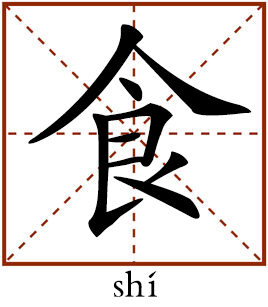Food

Considered a god for the people, food in Chinese culture provides a window in to the Chinese philosophy of tackling relationships with other people, nature and the world.
仓廪实则知礼节,衣食足则知荣辱。
cānglĭn shí zézhī lĭjié, yīshí zú zézhī róngrŭ
Canglin means “granary” while shi means “being full.” Lijie refers to rites and etiquette that govern the both national and personal behaviors. Yi means “clothes” while shi means “food.” Zu means “abundant.” Rong means honor while ru means “shame.” Zezhi means “then to know or gain.”
This idiom, taken literally, means that if the people have enough food supply stored in granaries, they will pay attention to etiquette; If the people have enough food and clothes, they stress honor and shame.
It is used to say that the material foundation of life will substantially affect one’s pursuit of cultural literacy and higher moral ideals. It would seem impractical to expect a person to be noble or honorable when one faces starvation, although Chinese culture highly admires a person who lives a simple but principled life.
治大国若烹小鲜
zhì dàguó ruò pēng xiăoxiān
Zhi means “to govern” while daguo means “a great nation.” Ruo means “being like” or “resemble.” Peng means “to cook” while xiaoxian means “small fish.” This idiom, taken literally, means that governing a great nation is like cooking small fish.
Originating from the Taoist classic the Tao Te Ching, the idiom is frequently quoted to demonstrate the political philosophy that the greatest approach to governance is the simplest. Stirring the small and delicate fish when cooking will break the fish into pieces. Taoism proposes following the natural course of development and the least interference with people’s daily life in governance. This echoes the modern philosophy of public administration that the government should play an increasing role in serving people’s daily lives and the operation of companies rather than ordering them around.
(edited by CHEN ALONG)
